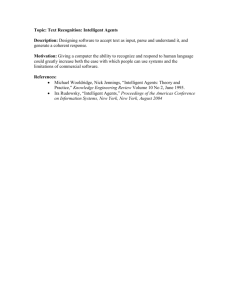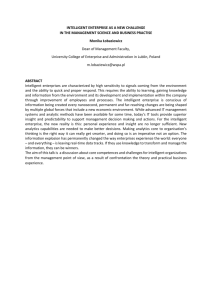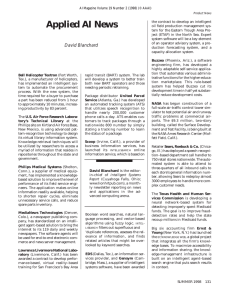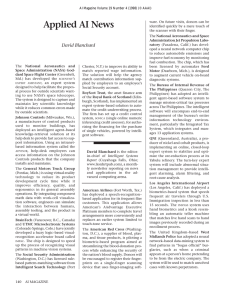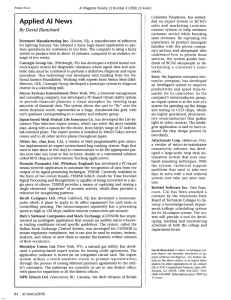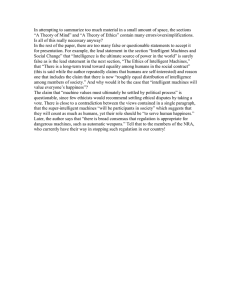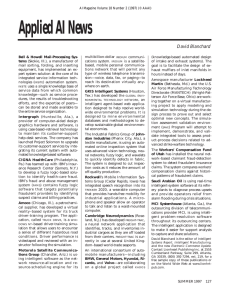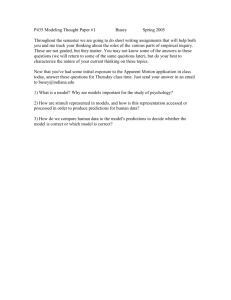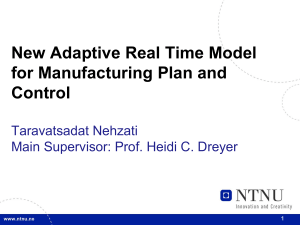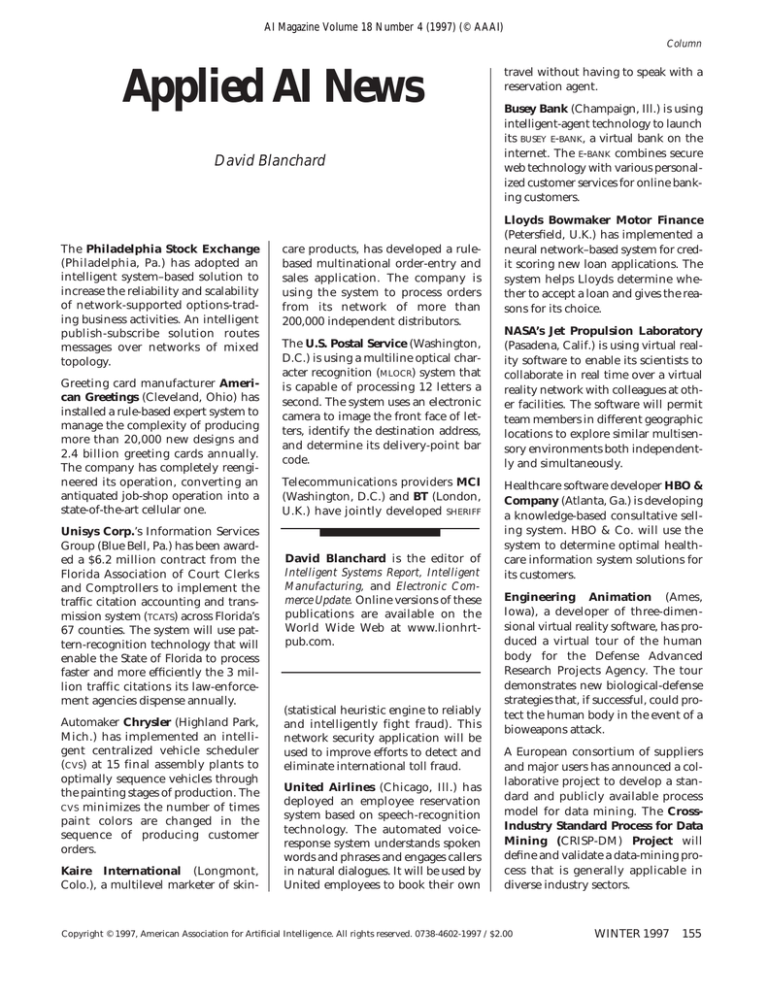
AI Magazine Volume 18 Number 4 (1997) (© AAAI)
Column
Applied AI News
David Blanchard
The Philadelphia Stock Exchange
(Philadelphia, Pa.) has adopted an
intelligent system–based solution to
increase the reliability and scalability
of network-supported options-trading business activities. An intelligent
publish-subscribe solution routes
messages over networks of mixed
topology.
Greeting card manufacturer American Greetings (Cleveland, Ohio) has
installed a rule-based expert system to
manage the complexity of producing
more than 20,000 new designs and
2.4 billion greeting cards annually.
The company has completely reengineered its operation, converting an
antiquated job-shop operation into a
state-of-the-art cellular one.
Unisys Corp.’s Information Services
Group (Blue Bell, Pa.) has been awarded a $6.2 million contract from the
Florida Association of Court Clerks
and Comptrollers to implement the
traffic citation accounting and transmission system (TCATS) across Florida’s
67 counties. The system will use pattern-recognition technology that will
enable the State of Florida to process
faster and more efficiently the 3 million traffic citations its law-enforcement agencies dispense annually.
Automaker Chrysler (Highland Park,
Mich.) has implemented an intelligent centralized vehicle scheduler
(CVS) at 15 final assembly plants to
optimally sequence vehicles through
the painting stages of production. The
CVS minimizes the number of times
paint colors are changed in the
sequence of producing customer
orders.
Kaire International (Longmont,
Colo.), a multilevel marketer of skin-
care products, has developed a rulebased multinational order-entry and
sales application. The company is
using the system to process orders
from its network of more than
200,000 independent distributors.
The U.S. Postal Service (Washington,
D.C.) is using a multiline optical character recognition (MLOCR) system that
is capable of processing 12 letters a
second. The system uses an electronic
camera to image the front face of letters, identify the destination address,
and determine its delivery-point bar
code.
Telecommunications providers MCI
(Washington, D.C.) and BT (London,
U.K.) have jointly developed SHERIFF
David Blanchard is the editor of
Intelligent Systems Report, Intelligent
Manufacturing, and Electronic Commerce Update. Online versions of these
publications are available on the
World Wide Web at www.lionhrtpub.com.
(statistical heuristic engine to reliably
and intelligently fight fraud). This
network security application will be
used to improve efforts to detect and
eliminate international toll fraud.
United Airlines (Chicago, Ill.) has
deployed an employee reservation
system based on speech-recognition
technology. The automated voiceresponse system understands spoken
words and phrases and engages callers
in natural dialogues. It will be used by
United employees to book their own
travel without having to speak with a
reservation agent.
Busey Bank (Champaign, Ill.) is using
intelligent-agent technology to launch
its BUSEY E-BANK, a virtual bank on the
internet. The E-BANK combines secure
web technology with various personalized customer services for online banking customers.
Lloyds Bowmaker Motor Finance
(Petersfield, U.K.) has implemented a
neural network–based system for credit scoring new loan applications. The
system helps Lloyds determine whether to accept a loan and gives the reasons for its choice.
NASA’s Jet Propulsion Laboratory
(Pasadena, Calif.) is using virtual reality software to enable its scientists to
collaborate in real time over a virtual
reality network with colleagues at other facilities. The software will permit
team members in different geographic
locations to explore similar multisensory environments both independently and simultaneously.
Healthcare software developer HBO &
Company (Atlanta, Ga.) is developing
a knowledge-based consultative selling system. HBO & Co. will use the
system to determine optimal healthcare information system solutions for
its customers.
Engineering Animation (Ames,
Iowa), a developer of three-dimensional virtual reality software, has produced a virtual tour of the human
body for the Defense Advanced
Research Projects Agency. The tour
demonstrates new biological-defense
strategies that, if successful, could protect the human body in the event of a
bioweapons attack.
A European consortium of suppliers
and major users has announced a collaborative project to develop a standard and publicly available process
model for data mining. The CrossIndustry Standard Process for Data
Mining (CRISP-DM) Project will
define and validate a data-mining process that is generally applicable in
diverse industry sectors.
Copyright © 1997, American Association for Artificial Intelligence. All rights reserved. 0738-4602-1997 / $2.00
WINTER 1997
155

